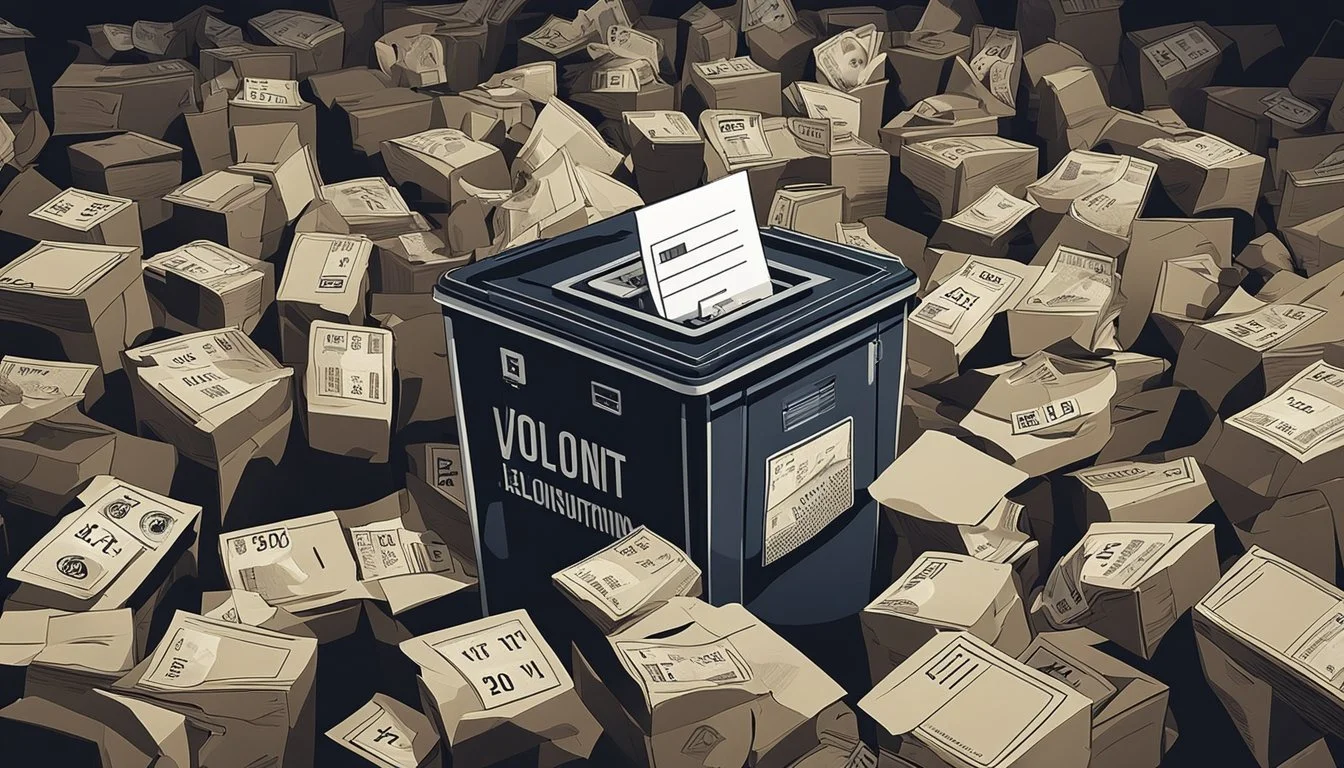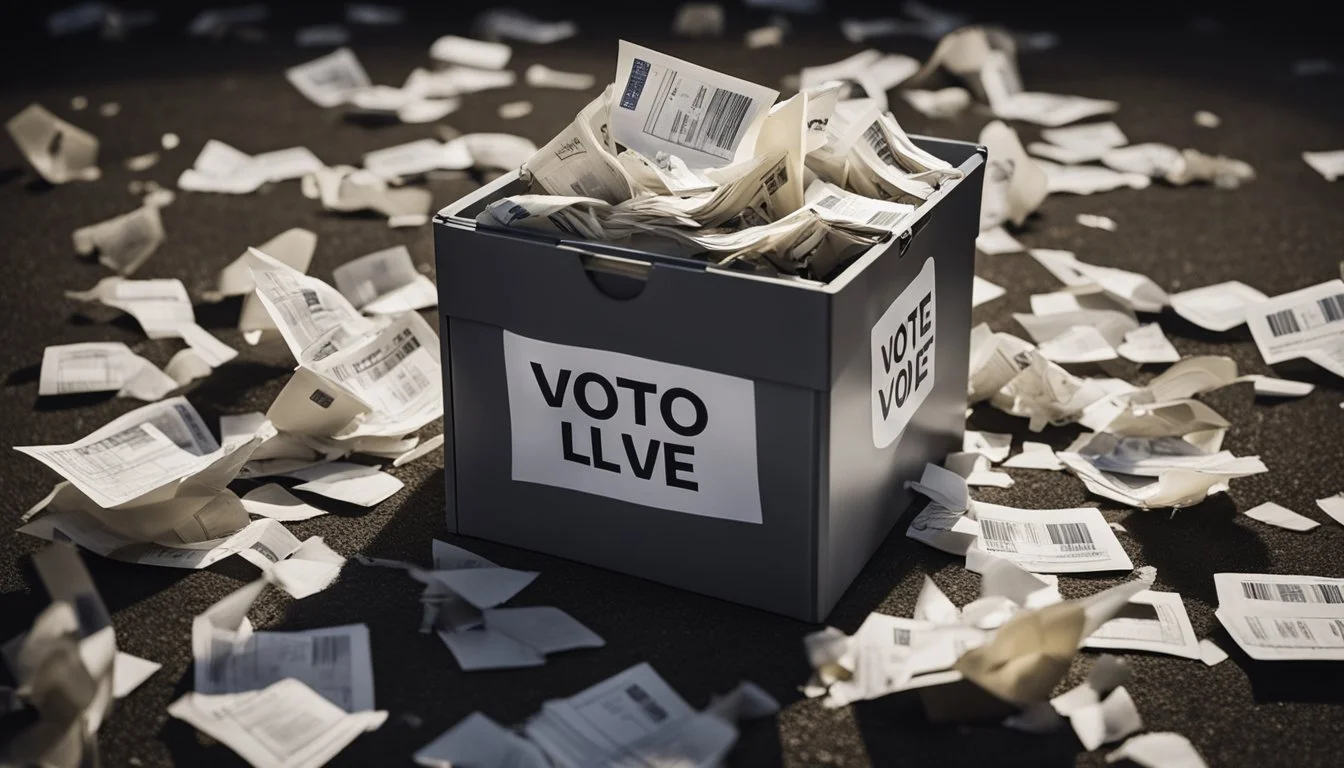12 Eye-Opening Films About Election Fraud
Unveiling the Truth Through Cinema
Documentaries and films about election fraud have gained significant attention in recent years, pushing this controversial topic into the public spotlight. From allegations of tampered ballots to claims of voter suppression, these films explore various aspects of how elections can be influenced or manipulated. These eye-opening documentaries offer viewers a deeper insight into the complexities of electoral integrity and the potential threats to democratic processes.
Filmmakers and storytellers have tackled these issues from multiple perspectives, often highlighting both verified instances of misconduct and more speculative claims. By showcasing a range of scenarios and expert opinions, these films encourage critical thinking and dialogue about the state of modern elections. Audiences are prompted to consider both the safeguards in place to protect voter rights and the vulnerabilities that may exist within the system.
1) The Manchurian Candidate (1962)
"The Manchurian Candidate" stands out as a gripping political thriller, touching on themes of brainwashing and manipulation within the political sphere. Directed by John Frankenheimer, the film is based on Richard Condon's 1959 novel and stars Frank Sinatra, Laurence Harvey, and Angela Lansbury.
The plot revolves around a group of American soldiers captured during the Korean War who are brainwashed by communists. One soldier, played by Laurence Harvey, is programmed to become an assassin. Upon returning home, he becomes an unwitting pawn in a political conspiracy.
Frank Sinatra plays Major Bennett Marco, who begins to unravel the plot and seeks to prevent the political coup. Angela Lansbury portrays the manipulative mother of Harvey's character, adding a chilling element to the narrative.
The film delves into Cold War paranoia and critiques the era's political extremism. It combines suspense, political commentary, and psychological depth, making it a landmark in the genre of political thrillers.
Released during the height of the Cold War, "The Manchurian Candidate" remains a powerful examination of the potential for corruption within the political process. Its influence extends beyond cinema, contributing to discussions on political and psychological manipulation.
For further information on "The Manchurian Candidate," visit Wikipedia.
2) Recount (2008)
"Recount" is a gripping HBO film that delves into the tumultuous events surrounding the 2000 U.S. Presidential election between George W. Bush and Al Gore. Directed by Jay Roach, the film chronicles the five-week period of intense ballot recounting in Florida that ultimately determined the election's outcome.
The film stars Kevin Spacey, Bob Balaban, Ed Begley Jr., and Laura Dern, who delivers a standout performance as Florida Secretary of State Katherine Harris. The cast's portrayal of the legal and political drama captures the chaotic atmosphere and high stakes of the recount process.
"Recount" not only highlights the legal battles and procedural disputes but also provides a human look at the individuals involved. From campaign lawyers to election officials, the film offers a multi-faceted perspective on the crisis that gripped the nation.
For more information, visit IMDb.
3) The Ides of March (2011)
"The Ides of March" is a gripping political drama directed by George Clooney. The film stars Ryan Gosling as an ambitious staffer working for a new presidential candidate, played by Clooney. The plot unravels the complexities and moral ambiguities of campaign politics.
Set against the backdrop of a tense presidential primary, the film explores how power dynamics and ethical compromises shape political landscapes. Philip Seymour Hoffman and Paul Giamatti deliver compelling performances as senior campaign advisors.
Adapted from Beau Willimon's play "Farragut North," the movie delves into the cutthroat nature of American politics. Gosling's character faces disillusionment as he gets a crash course on political machinations.
Evan Rachel Wood's portrayal of a young intern adds another layer to the unfolding drama. The film, rich in dialogue and tension, underscores the unpredictable nature of political campaigns.
For more information, visit the Wikipedia page or the IMDB page.
4) Mr. Smith Goes to Washington (1939)
Frank Capra's "Mr. Smith Goes to Washington" is a notable political comedy-drama that digs into the realm of government corruption. This 1939 film stars James Stewart as Jefferson Smith, a naive and idealistic youth leader appointed as a United States senator.
Upon arrival in Washington, Smith is caught off guard by the rampant corruption and attempts to stand up against it. The film portrays his struggle to expose the deep-seated bribery and manipulation, emphasizing the moral decay within the political system.
Jean Arthur, Claude Rains, and Edward Arnold deliver compelling performances alongside Stewart. The screenplay, crafted by Sidney Buchman, was based on an unpublished story by Lewis R. Foster. It remains one of Capra's most acclaimed works due to its incisive critique of political corruption.
The impact of this film extends beyond its narrative, as it has influenced public perception of political integrity and idealism. It serves as a timeless reminder of the importance of vigilance and accountability in governance.
For more information on "Mr. Smith Goes to Washington," please visit Wikipedia or IMDb.
5) Primary Colors (1998)
"Primary Colors" is a comedy-drama film directed by Mike Nichols. The screenplay, adapted by Elaine May, is based on the novel "Primary Colors: A Novel of Politics" by Joe Klein. This film provides a fictionalized account of a Southern governor's campaign for the presidency, which closely mirrors Bill Clinton's 1992 campaign.
John Travolta stars as Jack Stanton, the charismatic governor, with Emma Thompson playing his wife, Susan Stanton. The cast also includes Kathy Bates and Billy Bob Thornton, providing strong performances that enhance the film's political drama.
The film stands out for its realistic depiction of the intricacies of political campaigns. It addresses themes of morality, political ambition, and personal compromise. Viewers are given a behind-the-scenes look at the strategies and scandals that often accompany a presidential campaign.
"Primary Colors" manages to be both funny and insightful, shedding light on the sometimes murky world of politics. It’s a must-watch for those interested in political dramas with rich character development and a keen observation of American electoral processes.
For more information, visit IMDb.
6) The Best Man (1964)
"The Best Man" (1964) is a political drama directed by Franklin J. Schaffner and based on a play by Gore Vidal. This film showcases intense political maneuverings and backroom deals that occur in the race for a presidential nomination.
Starring Henry Fonda and Cliff Robertson, the film explores themes of ethics, loyalty, and personal ambition. The story highlights two main characters who represent different political ideologies, vying for their party's nomination.
In addition to its gripping plot, "The Best Man" offers a glimpse into the complexities and sometimes underhanded tactics involved in political campaigns. The performances by the leading actors are compelling, adding depth to the narrative.
For more information on "The Best Man," visit IMDb.
7) Election
Released in 2005, "Election" is a Hong Kong crime thriller directed by Johnnie To. While not directly about electoral fraud, it explores the power struggles and corruption within a triad society during the selection of a new boss.
The portrayal of manipulative tactics and backdoor dealings keeps viewers on the edge, highlighting the lengths to which individuals will go to secure power.
Events in the film draw uncanny parallels to real-life electoral fraud, despite its focus on organized crime rather than political elections.
Viewers see how various members of the triad employ bribery, coercion, and violence to influence the outcome, mirroring tactics that have been alleged in actual political scenarios.
The movie's gritty narrative and compelling performances make it a must-watch for those interested in the darker aspects of power dynamics.
More information on "Election": IMDb.
8) The Contender (2000)
The Contender, released in 2000, is an American political drama directed by Rod Lurie. The film stars Gary Oldman, Joan Allen, Jeff Bridges, and Christian Slater. It revolves around a fictional U.S. President, played by Jeff Bridges, and the controversy surrounding the appointment of a new Vice President, portrayed by Joan Allen.
The storyline delves into political machinations and the intense scrutiny that political candidates undergo. Senator Laine Hanson, the Vice Presidential contender, faces severe backlash and a smear campaign, highlighting how personal histories can be manipulated in political battles. The film was critically acclaimed for its performances and its timely depiction of Washington politics.
Rod Lurie’s direction and the compelling script present a gripping tale of political intrigue and the ethics of power. Joan Allen’s portrayal of Laine Hanson earned her an Academy Award nomination for Best Actress. The film also serves as a commentary on the political climate of its time, reflecting on issues of gender and integrity within the highest echelons of government.
The Contender provides a nuanced look at the complexities of American electoral politics and the personal costs of public service.
For more information about The Contender, visit IMDb.
9) Swing Vote (2008)
Swing Vote is a comedy-drama that explores the unlikely scenario of a U.S. presidential election hinging on the single vote of a man named Bud Johnson.
Kevin Costner stars as Bud Johnson, an apathetic and alcoholic egg inspector living in New Mexico.
The film focuses on how both presidential candidates, portrayed by Kelsey Grammer and Dennis Hopper, attempt to sway Bud's vote through various strategies.
Directed by Joshua Michael Stern, the movie also features performances by Paula Patton, Nathan Lane, Stanley Tucci, George Lopez, and Madeline Carroll.
The film captures the absurdity and intensity of political campaigns, providing both humorous and critical insights into the lengths candidates will go to secure a win.
While it leans heavily on comedic elements, it poses thought-provoking questions about electoral processes and individual influence.
For more information, visit the Swing Vote IMDb page.
10) All the President's Men (1976)
"All the President's Men" is a biographical political thriller focusing on the Watergate scandal that led to President Richard Nixon's resignation.
Directed by Alan J. Pakula, the film stars Robert Redford and Dustin Hoffman as journalists Bob Woodward and Carl Bernstein, who uncover the details of the scandal for The Washington Post.
Based on the 1974 non-fiction book by Woodward and Bernstein, the film showcases investigative journalism at its finest, detailing the reporters' relentless pursuit of the truth amidst obstructions and cover-ups.
The screenplay, written by William Goldman, captures the intense and methodical nature of the investigation.
The film's portrayal of the Watergate scandal provides an in-depth look into political corruption and the importance of a free press in a democratic society.
"All the President's Men" received critical acclaim and several awards, including four Academy Awards.
For more information on the film, visit IMDB or Wikipedia.
11) The Last Hurrah (1958)
The Last Hurrah is a 1958 political satire directed by John Ford. The film is an adaptation of Edwin O'Connor's 1956 novel of the same name.
Spencer Tracy stars as Frank Skeffington, an old Irish-American political boss running for re-election as mayor of a U.S. town. This election is portrayed as his final campaign effort.
The film explores themes of political strategy, loyalty, and the changing landscape of American politics. Skeffington's bid for re-election serves as a vehicle to examine the complexities and often contentious nature of political life.
The Last Hurrah offers a poignant look at the end of an era in political history, marked by the rise of modern media and changes in voter dynamics. The character of Skeffington, portrayed by Tracy, symbolizes the old-school politician grappling with new societal shifts.
For more information, visit Wikipedia or IMDb.
12) Wag the Dog (1997)
"Wag the Dog," directed by Barry Levinson, stars Dustin Hoffman and Robert De Niro. The film explores the manipulative power of media in the context of political scandals.
Shortly before an election, a spin-doctor and a Hollywood producer fabricate a war to divert attention from a presidential scandal. This plot reveals the lengths to which politicians might go to cover up their misdeeds.
The film's portrayal of deceit and manipulation raises questions about the integrity of political processes. It also underscores concerns about the influence of media on public perception.
"Wag the Dog" provides a satirical yet unsettling glimpse into the darker aspects of political maneuvering. The story remains relevant, reflecting ongoing societal concerns about truth and transparency.
For more information, visit IMDb's page on Wag the Dog.
The Impact of Election Fraud on Democracy
Election fraud has profound implications for the functioning and stability of democratic institutions. This section looks at its effects through both historical and modern lenses.
Historical Context
Throughout history, instances of election fraud have been seen in various forms. In 19th-century America, Tammany Hall became infamous for rigging elections in New York City. Ballot stuffing and voter intimidation were prevalent in many regions. These practices undermined trust in the democratic process.
The prevalence of fraud in early elections often led to significant political upheaval. For instance, the disputed presidential election of 1876, between Rutherford B. Hayes and Samuel J. Tilden, heightened partisan tensions and nearly sparked a constitutional crisis. These historical episodes highlight how election fraud can erode public trust and disrupt governmental stability.
Modern Implications
In contemporary times, the perception and reality of election fraud continue to pose risks. The 2020 U.S. presidential election became a focal point, with widespread claims of fraud despite substantial evidence to the contrary. A Collaborative Multi-Racial Political Study indicated significant portions of the electorate doubted the integrity of the election results.
Modern election fraud claims can polarize societies, diminish voter turnout, and weaken democratic institutions. Misleading information spreads rapidly through social media, exacerbating divisions and undermining electoral confidence. Additionally, false allegations can delegitimize future electoral outcomes and fuel political extremism.
By examining both historical and modern implications, one can see how election fraud and its perception have the potential to undermine democracy. These insights underscore the need for robust electoral systems and informed public discourse.
Analyzing Key Themes in Election Fraud Films
Election fraud films often grapple with complex themes such as corruption and public trust, examining how these issues shape democratic processes. These films highlight real-world implications and provide critical insights into electoral integrity.
Corruption and Deception
Films focusing on election fraud frequently showcase systematic corruption. They delve into tactics like vote tampering, ballot stuffing, and fraudulent voting machines. Documentaries such as A Little Light'll Do Ya: Defending Democracy in America and 2000 Mules explore these deceptive practices in detail.
These films often emphasize the role of powerful entities manipulating the voting process for personal or political gain. By presenting evidence and expert analysis, they aim to reveal the extent of the corruption that undermines democratic institutions. Corruption is portrayed not only as a localized issue but one that can impact national and even global politics.
Some documentaries incorporate interviews with whistleblowers, journalists, and experts. These firsthand accounts serve to underscore the pervasive nature of electoral deception. The detailed examination of voting irregularities and malpractices helps the audience understand the mechanics behind fraudulent activities.
Public Trust and Mistrust
Another prevalent theme in these films is the erosion of public trust. The persistent depiction of election fraud leads to growing skepticism about the legitimacy of electoral outcomes. No Evidence for Systematic Voter Fraud: A Guide to Statistical Claims and other works examine this growing mistrust.
Films highlight how accusations of fraud, whether substantiated or not, have a profound impact on voter confidence. They focus on the psychological and social consequences, including increased polarization and disenfranchisement among voters. This mistrust is further amplified by partisan rhetoric and media coverage, creating a cycle of doubt and suspicion.
Documentaries often discuss the long-term implications of diminished public trust, suggesting that it can weaken the very foundations of democracy. By presenting case studies and statistical analyses, these films illustrate the challenges of restoring faith in the electoral process.
Conclusion: The themes of corruption and public mistrust in election fraud films are vital for understanding the broader implications on democracy. These films provide explicit examples and thorough analysis to help viewers grasp the severity and complexity of these issues.
How Filmmakers Approach Election Fraud
Filmmakers use diverse methods to explore the contentious issue of election fraud, balancing factual accuracy and engaging storytelling. These methods broadly fall into two categories: documentary techniques and dramatization or fictionalization.
Documentary Techniques
In dissecting election fraud, documentary filmmakers prioritize factual accuracy and investigative approaches. They often use interviews with experts, politicians, and alleged witnesses, providing firsthand accounts and varied perspectives.
Archival footage plays a crucial role, offering historical context through past news reports, official documents, and public addresses. The use of graphics and visualizations helps clarify complex data, making statistics accessible and comprehensible.
Films like 2,000 Mules employ these methods to present and support their claims, even if those claims are controversial. By weaving together these elements, documentarians aim to construct compelling arguments while maintaining the viewer's trust.
Dramatization and Fictionalization
Other filmmakers opt for dramatization or fictionalization to delve into the topic. These films use narrative techniques found in traditional cinema, such as character development, dialogue, and plot twists, to craft engaging stories.
Dramatizations may blend real-life events with fictional elements to simplify complex issues and make the subject more relatable. Filmmakers sometimes introduce fictional characters facing dilemmas or searching for truth, which can make the exploration of election fraud more personal and emotionally engaging.
While these films might not always stick to factual accuracy, they can provoke thought and discussion, raising awareness about the implications of election fraud in an accessible format.












